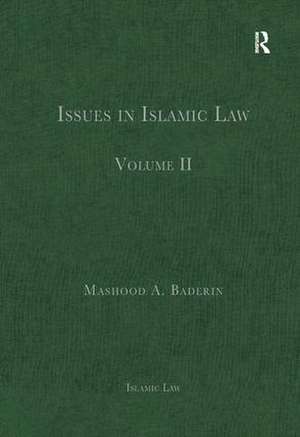Issues in Islamic Law: Volume II: Islamic Law
Editat de MashoodA. Baderinen Limba Engleză Hardback – 20 mai 2014
Preț: 2154.18 lei
Preț vechi: 3056.10 lei
-30% Nou
Puncte Express: 3231
Preț estimativ în valută:
412.19€ • 431.53$ • 341.07£
412.19€ • 431.53$ • 341.07£
Comandă specială
Livrare economică 17-31 martie
Doresc să fiu notificat când acest titlu va fi disponibil:
Se trimite...
Preluare comenzi: 021 569.72.76
Specificații
ISBN-13: 9780754628767
ISBN-10: 0754628760
Pagini: 694
Dimensiuni: 169 x 244 x 49 mm
Greutate: 3.45 kg
Ediția:1
Editura: Taylor & Francis
Colecția Routledge
Seria Islamic Law
Locul publicării:Oxford, United Kingdom
ISBN-10: 0754628760
Pagini: 694
Dimensiuni: 169 x 244 x 49 mm
Greutate: 3.45 kg
Ediția:1
Editura: Taylor & Francis
Colecția Routledge
Seria Islamic Law
Locul publicării:Oxford, United Kingdom
Cuprins
Contents: Introduction. Part I Islamic Family Law: Marriage in Islamic law: the modernist viewpoints, Majid Khadduri; Invalid and void marriages in Hanafi law, J.N.D. Anderson; Equality (kafÄ’ah) in the Muslim law of marriage, Farhat J. Ziadeh; Mahr: legal obligation or rightful demand?, Mona Siddiqui; Marriage-guardianship and minor’s marriage at Islamic law, Lucy Carroll; Polygamy in traditional and contemporary Islamic law, Doreen Hinchcliffe; Women and divorce: the position of the SharÄ«Ê»ah, Abdul-Fatah Makinde ʼKola; A critical appraisal of ’triple divorce’ in Islamic law, Nehaluddin Ahmad; TafwīḠal-ṬalÄq: transferring the right to divorce to the wife, Fareeha Khan; A husband’s authority: emerging formulations in Muslim family laws, Lynn Welchman. Part II Islamic Law of Succession: The role of pre-Islamic customs in the Islamic law of succession, M. Habibur Rahman; The Islamic inheritance system: a socio-historical approach, David S. Powers; The Qur’anic law of inheritance, Richard Kimber; Representational succession in contemporary Islamic law, N.J. Coulson. Part III Islamic Law of Financial Transactions: Negotiating contracts in Islamic and Middle Eastern laws, Mahdi Zahraa; Contracts in Islamic law: the principles of commutative justice and liberality, Hussein Hassan; The concept of musharakah and its application as an Islamic method of financing, Muhammad Taqi Usmani; Islamic laws on riba (interest) and their economic implications, M. Siddieq Noorzoy; The Islamic law of real security, Nicholas H.D. Foster. Part IV Islamic Criminal Law: Islamic criminal law and procedure: religious fundamentalism v. modern law, Matthew Lippman; The concept of ḥadd in Islamic law, Fazlur Rahman; Effective legal representation in ’SharÄ«Ê»ah’ courts as a means of addressing human rights concerns in the Islamic criminal justice system of Muslim states, Mashood A. Baderin. Part V Islamic Judicial Procedure: Muslim procedure and evidence, J.N.D. Anders
Notă biografică
Mashood A. Baderin is Professor of Law at the School of Law, SOAS, University of London, UK.
Descriere
The articles in this volume engage critically with selected substantive issues in Islamic law, including family law; law of inheritance; law of financial transactions; criminal law; judicial procedure; and international law (al-siyar). These areas of substantive law have been selected due to their contemporary relevance and application in different parts of the Muslim world today. The volume features an introductory overview of the subject as well as a comprehensive bibliography to aid further research.

